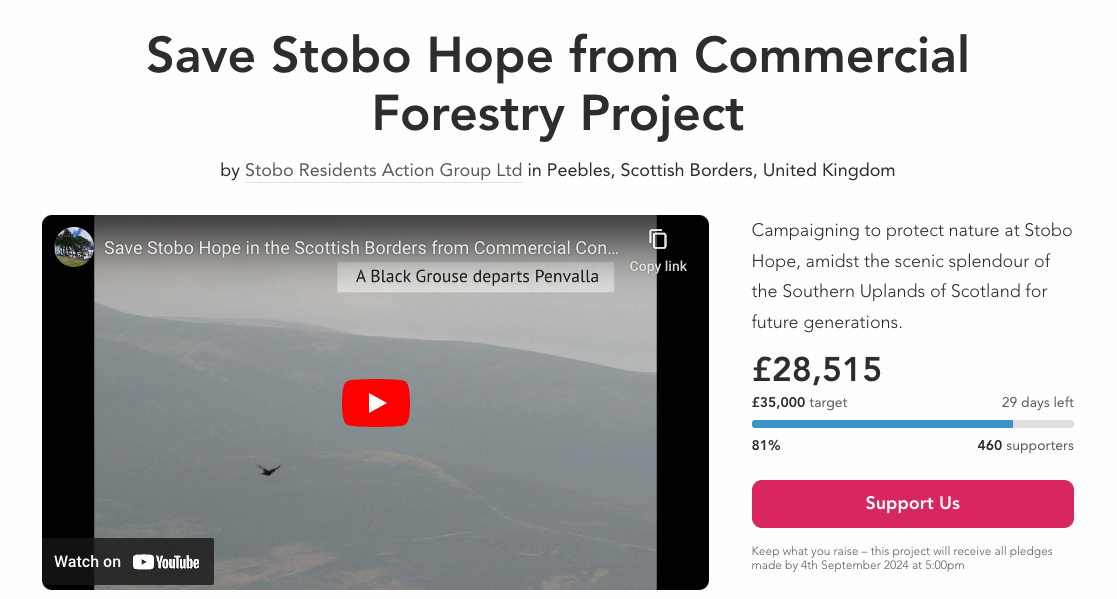


A controversial Scottish forestry project led by a Guernsey-based fund is heading for the courts after campaigners won the right to sue over the decision to approve the project.
True North Real Estate Partners, and its Forestry Carbon Sequestration Fund, has raised capital, including a £2m Scottish government grant, to purchase redundant farmland in the country to create new forests to support the UK’s net-zero goals and allow for commercial carbon offsetting.
But campaigners have argued that the Stobo Hope plantation in Peebles, which already has saplings in the ground, should never have been approved by Scottish Forestry without an Environmental Impact Assessment.
The group have now been given the greenlight by the Edinburgh Court of Session to put the argument before the Scottish courts and have crowdfunded tens of thousands of pounds to support the legal challenge.
More than a million non-native Sitka spruce trees are hoped to be plantedover around seven square kilometres - planting got underway in March.
Scottish Forestry and the Fund have insisted that effects on native wildlife and the landscape of what is a nationally designated scenic area have been properly considered, with a three-year period of consultation with communities carried out.
The government says forestry projects will help to limit climate change and biodiversity loss.
The campaigners, however, fear that local species such as the black grouse will be affected, and the monoculture of trees being used for local timber once fully grown will lead to unacceptable effects on the moorlandamounting to greenwashing.
NatureScot had advised that the plantation would damage the area and called for more mitigation, but Scottish Forestry had the final say and concluded significant impacts were unlikely.

Pictured: Sikta spruce are native to north America.
Grumblings over the project, and the Guernsey link, have also been raised in the Scottish parliament.
Green MSP Ariane Burgess told lawmakers in June that “right now, trust in the transparency and social responsibility of large-scale conifer projects is low.
“Just one example is the campaign to oppose a large commercial Sitka spruce plantation in Stobo Hope that is intended to be used for carbon offsetting. The campaign’s crowdfunder page says that ‘the views of the local community appear to have been sidelined’.
“Meanwhile, the Scottish government has given more than £2m to a trust fund based in the tax haven of Guernsey, which bought the land for that project.”
The Fund’s registered address is Royal Plaza in St Peter Port. It was confirmed as a Guernsey Green Fund – the world’s first regulated green investment product – after pledging to reaching a carbon sequestration target of 1.65m tonnes through forestry sequestration.
Conifers such as Sikta are one of the most common non-native plants used for forestry projects in the UK.
But conservationist charity John Muir Trust said it wasn’t convinced the planting scheme would result in environmental benefits.
“Companies are purchasing land in Scotland to plant fast growing softwood trees to then sell carbon credits. In the case of Stobo Hope, Sitka spruce production and carbon credits appear to be the main motivation for buying the land,” it said.
“The Trust is cautious about claims that softwood plantations result in net gains for carbon sinks when other factors are considered. These factors include diesel powered machinery used in commercial timber operations, the carbon released from the soil when disturbed by ground preparation works for planting and again when the wood is extracted, the relatively shortlifecycle of the woodland created and the onward supply chain for the timber products industry.”

Pictured: A date is yet to be set for hearings in court.
Scotland’s national academy has also criticised large-scale conifer plantations saying maximising the number of trees has adverse consequences for carbon sequestration and biodiversity.
The Royal Society of Edinburgh accused the Scottish Nationalist Party of ploughing millions into tree planting projects based on questionable data, with more than 33,000 hectares planted this decade.
It found that carbon captured by trees would be less than a third of what’sinitially estimated because of the timber industries’ desire to fell trees while they’re still young.
Comments
Comments on this story express the views of the commentator only, not Bailiwick Publishing. We are unable to guarantee the accuracy of any of those comments.